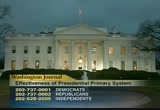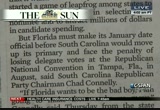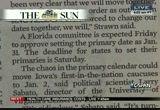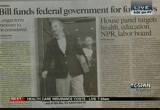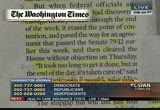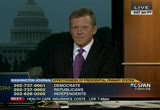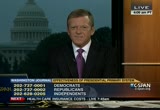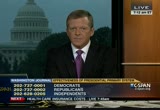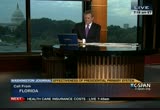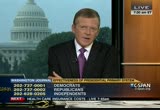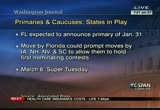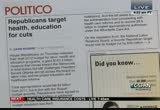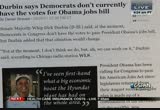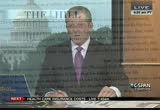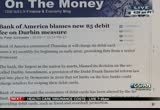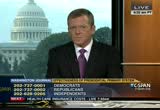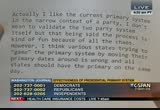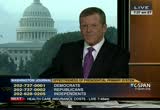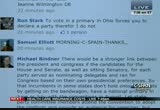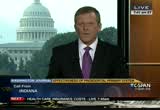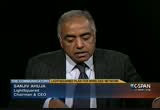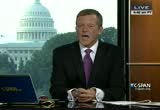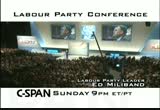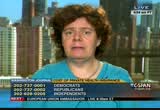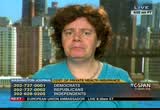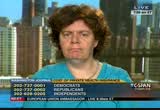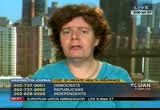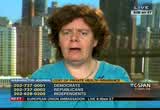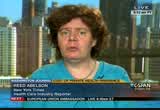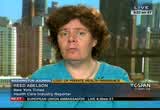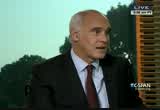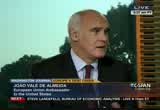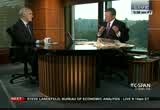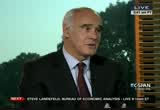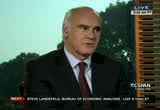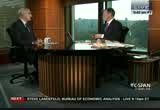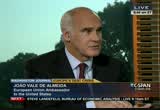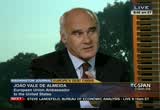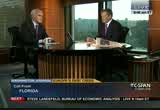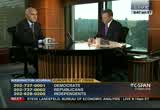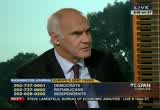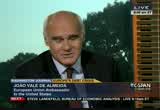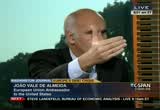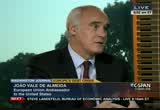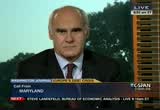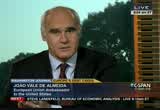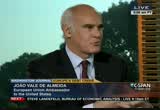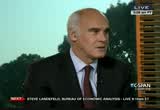tv Washington Journal CSPAN September 30, 2011 7:00am-9:00am EDT
7:00 am
joins us. steve landefeld. [captions copyright national cable satellite corp. 2011] [captioning performed by national captioning institute] host: well, the primary date is tomorrow and the primary could start at early at january 9 in iowa. florida is expected to announce today that it's moving its republican primary to january 1. in the first segment of the "washington journal" is how
7:01 am
effective do you think the presidential primary is? nevada and other places have been approved to hold theirs early. 202 is the area code. 737-triple zero 1 for democrats. triple zero 2 for republicans and 202-628-0205 for independents. you can send us a tweet at twitter.com/cspanwj or facebook to make a comment. you can also email us.
7:02 am
7:04 am
>> the chaos in the primary calendar could move iowa's first-in-the-nation caucuses to january 2, said political scientist larry sabato, director of the university of virginia's center for politics. what do you think about the effectiveness of the presidential primary system? we'll put the numbers back on the screen. please allow 30 days between your calls. wanted to point this out also. prominent u.s.-born cleric killed in yemen. anwar al-awlaki who became a prominent figure in al qaeda's most active branch using his
7:05 am
fluent english and internet savvy was killed friday in the mountains of yemen. they announced his death but gave no details of u.s. senior official and they support the claim he has been killed. they spoke on the condition of anonymity to discuss those matters. al al-awlaki it would be most prominent of the al qaeda to be killed since osama bin laden. in july leon i netta said he and al zawahiri were among the top being sought. from the washington times, bill funds government for four days. it took just nine points in
7:06 am
keep the federal government's basic operations running for the first four days of october at a rate of nearly $3 billion a day. the house was nearly empty when the texas republican asked for involuntary manslaughter consent asked for a stopgap bill to avoid a government shutdown that otherwise would have begun saturday, the start of the next fiscal year.
7:07 am
>> host: mr. carney questioned why there had been a threat of a shutdown when all sides had already agreed to a funding level of 2012 when they reached the debt deal early last month. >> conservatives had argued the house should stick to the lower 2012 spending level the house passed in its budget in the spring. that's from the washington times this morning. now back to your calls on the effectiveness of the primary. we start with an independent in california. hi ray. caller: hi there.
7:08 am
i've been an independent for all my life. i've been voting since 1980, and i've never voted for a presidential candidate that ever won. and i've always resented the two-party system hoisting their wharges on me as an independent. and i think the biggest thing that would help this country is to have more instant runoff voteing. i don't know how the parties do it within their organizations, but i've always resented that if there's any third or fourth candidate, independents are always worried that their first choice is never going to have a chance. because usually the major parties, the candidate can win with not a pluralty of the
7:09 am
vote. so i would just hope -- host: as an independent, you talk about being shut out of the system for this long. what about the fact that you're in california? do you feel that california gets ignored? do you think california should move up its primary date? caller: well, i admit our state is biased against the republicans and independents. but like i say, i think a whole new picture would come to light if people could actually go to the polls in the primaries in california, and by the way, i think this open primary is a farce that it's going to always have two of the same parties in the final race for our elections. host: lori is a democrat in cleveland. good morning. what do you think about the effectiveness? caller: i don't know. i'll have to really work on myself and look in the mirror and say positive things every
7:10 am
day. host: ok. caller: because i tell you, all of these republican candidates, all they do all day long every chance they get a camera is denigrate and lie on president obama. and the reason i know is because i started to research what he said, what he's doing and researching what they say he's doing. they all want to take us back to the same -- those same policies that we haven't gotten rid of yet. that got us in this position. seriously, what do you think about the system we use to nominate a president. caller: well, it would be a great system if we didn't have all this money in it. now our enemies can pay into our system. everybody all over the globe doesn't love us and a lot of
7:11 am
people who don't like us have big money in our system, and our system is working against us. because some of these republicans' plans are going to kill the low income and some of the middle class people. poverty kills. poverty kills, peter. and if you don't want to take money from the top and you just want to cut the bottom, you're going to kill thousands of people. host: isaiah in atlanta. independent line, what do you think about the effectiveness of the presidential primary, isaiah. >> good morning. caller: i think it's a fraud, as a black man in america, and my people before me slaves. i'm pretty sure my parents voted. and the neighborhoods are the same or even worse. the education system in the inner city is just the same or worse than it was in the ooh's and 60's, so what's the use of
7:12 am
voting? it ain't helped us yet and probably never will. can i ask you a question, peter? host: yes. caller: did you guys ever do a segment on the guy that got killed down here? host: i don't think we did. caller: i was just asking. it was an international story. and i see you guys talking about some guy killed in yemen this morning that ain't did nothing to nobody -- nothing i never seen him do nothing new orleans to nobody in america but the story in america, y'all lek cute a black man in georgia for nothing, it got no coverage on c-span. i was just asking a question. host: all right in indiana on our republican line, what do you think about the effectiveness of the presidential primary system?
7:13 am
caller: well, i don't think it's effective since it's so spread out. to piggyback on a previous caller, the way that they vorkts instant runoff voting is a good way but the best way is range voting. it maximizes voter satisfaction. host: what's range voting? caller: it's a system of voting where you give a score to the candidates and then they average those and the ones with the highest average actually become that particular candidate. works in primaries and multiseat elections. host: all right. thanks, edgar. too much money wasted on primaries? we need move to regional primaries. january the, the east, march, the west. change vote day to saturday.
7:14 am
"washington post" newt beginning bridge bolsters his plan. persistence has its reward. his presidential as operations has defied as operations, crept up in the polls and become a draw on the campaign trail. his tenacity has also bolstered his republican parties' idea brand who released his version of contract in america. it has even helped his wimbings calista, whose new children's book recently shot number three on amazon's list of best sellers.
7:15 am
7:16 am
line. am i saying your first name right? caller: yes. host: what do you think about the way we elect presidents in primaries? caller: well, i tell you, the first time i ever was interested in politics, i was in new hampshire. and it was when they had the big conventions, and that was the most exciting and wonderful thing and i loved it. and i don't know when we went into all this is that you have drags out for years. i like the old conventions. host: you liked the old conventions, but but you just said you were excited about new hampshire. >> well, benefits my husband in the air force and riveted on tv host: oh. ok. the conventions.
7:17 am
caller: maybe i didn't say the right word. conventions. i like that. host: you want to go back to that. huh? caller: yes. and get rid of these commercials. it's these commercials that cost so much, i think the tv channels must really love all this stuff, because of all the air time they can get. host: bellevue, florida. on our democrats line, good morning steve. caller: i don't think it's a matter of effectiveness. it's defectiveness. the primary cause. it distracts everybody, whether it be the party in power or the party you're trying to assume to the -- when there was enough of the process when trueman was
7:18 am
about to retire from his elected term and republicans were battling it out with eisenhower and adlay stevenson. obviously, there wasn't a lot of tv back then. particularly. it was really for the elites to really have tvs in their households. but this thing -- i'm inclined to agree with rush limbaugh and/or the ores, tv is manipulating people's opinions and perceptions, and one other thing, i vote for a candidate from england, basically. i mean, he's a naturalized american citizen but he keeps tabs of the goings noneurope and all. i don't want to suggest i'm for socialism or anything, but he
7:19 am
says when it comes time replace prime ministers, it's a matter of eight weeks outside and then we could start to finish. i think we should emulate that. this whole process is distracting president obama from his work for the last two years of his first term, you know? second term or not, he's having to deal with -- i don't think it's an effective process. i think it's defective. and i'll leave it at that. bye. host: democratic line hi janet. >>. caller: i think the presidential primary con by june you'll have your candidate, voting on candidates
7:20 am
during the primary in bad weather i think suppresses the vote. i think we should have rotating regional primaries to make it all a little bit more fair to states do get an opportunity to be earlier than over states. but you know, that's not a must-have. host: do you like the idea -- what do you think about the idea of florida moving up? caller: i think it's a terrible idea. i think they are going to end up with a candidate, and by june, they may regret having that particular candidate by june. i think it's just way too soon. people aren't interested in poll kicks. the republican primary is just
7:21 am
way too early. host: this is set by the republicans and the democrats have gone along with this but the republican national committee primary caucus deadline is tomorrow. new hampshire, by state law must schedule its primary at least seven days ahead of others. nevada state party rule is that with the republican caucuses four days after the and states are penlized requiring they forward half their delegates to the national convention. what we do know is that florida is expected to announce today its primary will be on january 31. the move by florida could prompt iowa, new hampshire, nevada and south carolina to allow them to hold their first nominating contest and march 6,
7:22 am
is super tuesday. next call comes from raleigh, north carolina, and jay on our democrats line. hi, jay. >> hi. i do agree with the process and i think it wastes money and it does waste time we could be using to try to work out what is going on during this current term, during the current president's term? i think halfway through the president is already starting to talk about the next election and then we take two years to start to work on the problems right now. i think we're being distracted by the political process.
7:23 am
and i just think this would be true for any president in any term, but especially as we see things changing in the world. i'd also like to see -- there's a study out of north carolina, the university of north carolina about the browning of america. i'd love to see everyone talking about that. because lots of times we talk as if only hispanics are illegal aliens, when in fact there are more illegal aliens from other countries that have come legitimately on visas and then never renew them. people are talking about not allowing education or funding to support illegals. well, it's just not hispanics. i wish we would focus on that study. host: thank you for calling in. from politico, republicans target health and they release
7:24 am
their draft 2012 budget for labor, health and education plans. a measure that moves towards the democrats in total dollars but still challenges his prized education and health care reforms. host: that's in politico. and in the hill this morning, durbin said democrats still have the vote for the jobs i will be. at the moment congress doesn't have the streets pass
7:25 am
7:26 am
the effectiveness of the presidential primary system. this tweet from connie, the primary is meant only to make money. it goes too long and needs to be scrapped and shortened to eight weeks stoorpt finish. this comment from connecticut liberal mom it's about as effective as.t. barnum was rolling in the dollars for nada. proves there really is a sucker born every toe then there's this tweet. host: brian is a republican in cincinnati. brian, good morning. what do you think about the effectiveness of the presidential primary system?
7:27 am
crime not unhappy with it -- caller: i'm not unhappy with it at all. host: now do you know when brian's primary is? caller: no. host: who are you supporting? caller: i haven't made up my mind yet. i really haven't made up my mind at all. host: thank you for calling in. gary is in donna, texas, on our independent line. hi, gary. caller: hello. host: what do you think? gary, you've got to turn down volume on your tv. ly come back to you but otherwise you get that delay. jacobs in jackson, georgia. independent line. good morning. caller: good morning. i was just calling in, because i believe -- i'm a young voter.
7:28 am
twelve 2we68 -- 2012 will be the first election i'll be voting in. i think the primaries prevent young voters from getting the politics. it's too focused on the other thingst we need to find a way to speed up the process, because it's keeping young people from hearing the voices, because it takes so long to get into it and be in understanding with politics. host: thank you jacob. bank of america announced thursday that it will charge
7:29 am
its debit card users a $5 monthly fee for debit card usage sparking fury. it blamed its decision on the fees banks can charge retailers for the use of debit cards. banks say the fee go to pay indirect cost of providing debit cards such as fraud and overdraft protection. senate majority whip dick disturb bin stayed bank just wants to protect robust profit margins. henry is a republican in new orleans. hen rirks you are on the "washington journal." what do you think about the effectiveness of the presidential primary system? caller: well, i'm not a republican. i'm a democrat. thank you for taking my call.
7:30 am
in listening to what y'all were talking about the primaries, one caller indicated the two primary system is not working. there should be a third group that should be formed to represent this country. it would be the party of the americans, and that would eliminate this tea party and everything else. because then you have to go dooned the right thing for this country which is not what we're getting with this stand in the middle and cross my line attitude. in the cal we know the world in 2012. i think we are going to self-destruct within. because when you look at what's actually going around us, it's not trying to make any progress. it seems like we are reversing our strides and gains over the last 100 years. when you look at the people that are out there, they are becoming more and more inclined
7:31 am
toward everybody but themselves and 99% of the republicans are the people who control and own all these billions of dollars. and they are not willing to do anything. and the primarys are not going to make that much difference right now because you have a supreme court and then on your other comment, we receive a -- host: that was henry a democrat in new orleans. rick perry to hold a town hall meeting with new hampshire voters. he'll hold that town hall meeting at the adams memorial opera house in dairy, new hampshire. c-span will cover that live. that is at 6:00 p.m. this evening eastern time. rick perry town meeting. donna, texas. gary on our independent line. you are back on the air.
7:32 am
gary, go ahead. caller: ok. i think the primaries were set up right. it allows a large majority of people to exam your candidates and make a good decision. i think that possibly right now people are messing up the system or even trying to manipulate the system, and i don't think it should be allowed. i think they need really strict rules on it. i do want to comment on what you were just showing on an article on newt beginning bridge. i think he has very different ideas but very strong for america and i really do think that people need to take another look at what he stands for and what he's presenting. and i just wanted to say that,
7:33 am
because it put the spin that he was just manipulating, you know, for his book sales and his own personal -- i just watched it. and i think it's very interesting and very strong as far as where we really need to go to put america back together. host: all right. thank you for calling in this morning. gary, this is an email from edward wins low. the primary system is fraudulent on its face, the political duopoly that's owned by multinational corporations and lobbyist-funded think tanks has stacked the deck against the status quo. another says i like the conduct party system in the narrow context of the party. i don't known validate two-party system itself, but that being said, the process is kind of fun because of all the chaos. however certain states trying
7:34 am
to gain the primary system by moving their primary dates around is wrong. all states should have their primary on the same day. is one of many bad decisions to come out of tallahassee. the sooner the candidate is selected, the sooner the smear campaigns can begin with anonymous corporations paving the way. this article from c-span.org this morning. admiral mullen's retirement ceremony is being held at fort mire, just across the patomic river in arlington, virginia, and you can watch that life at 11:00 a.m. this morning on c-span in case you're interested. one other programming note
7:35 am
tonight our -- he founded several labor unions and represented the socialist party of america ads cavend dat for president, he ran five times, the last time from prison engine 1920, the contenders this evening live from terre haute, indiana. "washington post" this morning has this article with this question -- cane? the g.o.p.'s next big thing? in case you're interested, "the washington post" is where that article is. william on our republican line, what do you think of the current stp? caller: i think it's effective and the fact that the media is are sensationalists and sort of make things bigger than they seem, it plays into the effect that
7:36 am
host: go ahead with your comments. just listen through the phone. caller: yes. well, i'm -- host: all right. gustavo on our republican line. how are you? caller: hello. i'm happy to have my answer on my call answered. host: gustavo, you've got to turn your volume on your tv. listen through the telephone. you and i will just have a conversation. caller: i have a question, how come ron paul is a republican, obviously, but he is not being taken seriously because of his thoughts on priorities and how people of the united states should be taken, yes, he's not taken very seriously because he's not very republican, i guess, and that bothers me,
7:37 am
because this should not be a republican or democratic party in this system, because all these political people have taken our country and just taken it into shambles, just destroyed it. tomas jefferson established something along -- host: so gustavo, right now you're leaning towards ron paul? caller: i'm not leaning towards anyone. i'm leaning towards the person who should lead our country out of its problems. for a moment there. i thought obama. i cared not democrats or republicans, but i thought for a second that he would be the man that would do it. but it doesn't matter. i know now it doesn't matter. whether it's a republican or democrat or independent. we are the people of this country. and i'm looking at you on my tv screen, and i wish you would
7:38 am
speak out of the, the people that are there in the media speak out and just say to the rest of us that have there is a big problem in congress and all the three branch os of government. host: gustavo, thank you for calling in. and thank you for watching. on our facebook page, nobila makes this comment -- >> i don't think there's much you can do when the majority of voters even understand the prime -- primary system.
7:39 am
host: from splito this morning, chris christy looking harder. reports that the new jersey governor is growing more serious after urging figures are henry kissinger and george with. bush. that's in splito. ewe'll show you the most a moment. that is picture of president obama meeting governor christy, and eugene robinson's column is about governor christie'sal weight, and it's entitled christie's heavy burden. chris christy needs to find some way to lose weight. like everyone else, elected officials perform best when they are in optimum health. you can argue this is none of my business but his issue with weight stopped being a private
7:40 am
matter. host: on average, eugene robinson writes, health care costs for obese persons are higher for those whose -- than those whose weight falls within the recommended range. host: that's eugene robinson's column this morning in the wash post, and here is the "new york post" spread on chris christy in a picture with his wife.
7:41 am
g.o.p.ers give the nrge governor a shove, is what he says and talks about how henry kissinger and george with. bush have been calling. this is also contained within the article. romney campaign, slowdown. mitt romney's campaign is not quite as in the money as it was. they will report raising between $11 million and $13 million, a dropoff from the $18 million he reported last quarter. next call comes from jeffersonville, indiana. roy, what do you think about the effectiveness of the presidential primary system? >> well, i'm not happy with it. think i it ought to be done in may. caller: that way it gives everybody a lot of time. but when you start moving states ahead of other states in the primary, it gives people saying i got to vote for so and so because they did.
7:42 am
but the whole thing amounts -- how many states have republican governors that have changed the districts and everything for their congress and senate seats, and flees one other thing i may ask you if you let me say it is back when president obama first couple weeks in officed that democrats and republican congress in to talk about what was going on, miss mcconnell asked him how many minutes republicans or democrats had. he didn't like the answer and he's a cry babey and since that day, his only belief, he's not helping anybody but himself just trying to get obama out of office. host: stan from the "washington post." the s.e.c. facings criticism from the f.c.c.
7:43 am
it's written the f.c.c.'s sat hite troubles became under fair to as -- lightsquared -- host: he added the company received no special favors from the f.c.c. cri criticalya mentioned the communicators program, here's just a portion of the lightsquared interview with the c.e.o. >> when i said we were building one close to the g.p.s. spectrum. as i said, the issues related
7:44 am
to precision devices, we have announced the solution last week. and amazingly, it had half a dozen or so g.p.s. manufactures that wanted to work with us. host: that will air, the communicators program, a one-hour interview conducted by c-span and cri criticalya of the "washington post" who sat in as the guest reporter. 6:30 p.m. on c-span on saturday it re-airs on c-span 2 8:00 a.m. and 8:00 p.m. from "usa today," the supreme court open to potentially epic
7:45 am
term that could roy debate. the justices have said -- in coming weeks, the justices will announce whether they will take on two major disputes over federal power, the most closely watched involving the new requirement that most people buy health insurance by 2014. the other concerns arizona's law allowing police to check the immigration status of people they have stopped. this could be a blockbuster term, depending on how events break, says washington lawyer john elwood. a former assistant u.s. solicitter general now in privatepractice. that's in "usa today" this morning. ira in south carolina, on our republican line, what do you think about the presidential
7:46 am
primary system, ira? caller: well, i think it takes too long, and i believe the whole country should vote on one day. that way everybody's vote counts just like in the elections. and then we would know who we really want to run. also i think there's too much money involved in the debate. it could be used more effectively if they put them on for one week and let each candidate each day be about one subject, the economy or the health care or the military budget or whatever the topics of the day should be. but each candidate should have an hour to give their own speech about how they feel about each topic of the day, not do get vote earlier, but it seems the ones that get to vote
7:47 am
earlier tend to influence the rest of the country which is why i think it would be fair if every state voted at the same time. host: are you leaning towards anybody? caller: i like ron paul, and i wish he would give a speech like give me liberty or give me death. i believe he would gave lot more attention. this is from e.r.a. now. we need to get all corporate dollars out of elections. public funding of elections is the only option. dr. dunk 2230 tweets in that it should reflect america. a few hicks in the sticks, iowa, new hampshire and south carolina should not determine our vast country's president. and tweeted is -- the primary system is way too much trouble for young people, perhaps an
7:48 am
iphone app so we can multitask while participating. and finally this article in the boston globe this morning -- hospitals push hike in age for medicare. as the deficit reduction supercommittee hunts for $1.5 trillion in additional savings, and it's said they plan to start lobbying next week to urge legislate ors to start raising the medicare eligibility age from 65 to 67 as one way of saving money without reducing payments to hospitals. that's in the boston globe this morning. we're going to be talking about health care costs in a moment with reed abelson of "the new york times." after that we're going to be
7:49 am
talking about the european debt crisis with the e.u.'s ambassador to the united states. we'll be right back to talk about health insurance policies. >> the head of the american association of university professors says that tenure and academic freedom are in jeopardy and need to be protected. >> tenure creates an atmosphere on campus where people can speak freely. not just in terms of their speaking but in terms of govern nance. if you don't like a proposal, you can speak freely about it. administrators should be able to do that as well. so that shared governance speech is what academic freedom protects. without that, you don't have the expertise of the faculty available to you. >> sunday night on c-span's "q&a."
7:50 am
he founded several labor unions and represented the socialist party of america as candidate for president running five times, the last time from prison. eugene debs lost but one of the 14 men featured in "the contenders" live from debs' home. watch some of our other videos about him at c-span.org/thecontenders. >> this is a dangerous time for britain. and a dangerous time for britain's economy. the government's austerity plan is failing. you can sense the fear people have as we watch the economic crisis that stalks our country in 2008. threatens to return. >> with the britain's house of commons still at recess, watch
7:51 am
labour party leader ed miliband 's talk. >> should always start with the assumption that when a politician or c.e.o. is saying something, they are not telling you the truth. now, they may be telling you the truth. but the burden should be on them to prove it. >> he's an eagle scout and directed and produced three of the top 10 grossing documentaries of all time and a best-selling author. a memoir, "here comes trouble," and your chance to tweet michael moore live at noon eastern on book tv on c-span 2. "washington journal" continues. host: and now joining us from new york city is reed abelson. she is a health care industry reporter with the "new york
7:52 am
times," ms. abelson, on wednesday this week you had the lead story in "the new york times," and here it is. health insurers push premiums higher and major health insurance companies have been charging sharply higher premiums, outstripping those working and creating more problems in unrelenting raises in medical costs and go on to talk about the large increases in premiums. why such a large increase? guest: we really don't know. the 9% increase was one no one really expected there was some thought before the health care law takes full effect the insurers were raising their prices. there were a couple of percentage points due to the new provisions in the health care law, but the truth is we
7:53 am
don't know why it went up so much. host: could you ex 357bd on what those health care provision costs may have been with regards to the new law going into snesket guest: sure. under the health care law some of the early previsions that go into effect are things like covering preventative services or adding adult children up to age 26 on your policies, and all of that costs a little more money, so the estimates are that perhaps 1% to 2% points was the cause, but the real driving force was the increase in underlying health care costs. doctors and hospitals charging more. people who are sick getting care, and that's costing money. host: as someone who covers the health care industry, is it fair to say that health care costs always seem to rise
7:54 am
higher than normal inflationary costs, etc.? and if that's true, why is that? and it's been a trend for years. >> yes. guest: that's very true. there's no doubt even when it's relatively low, it's much higher than inflation. last year, for example, installation was about 3%, and we had a 9% raise. and someone joked with me that it's because no matter what the rest of the economy is doing, health care is always a boom economy. and part of that is because of our system where the payment system encourages as much use as possible. at least that's general wisdom. and it's also because we have an aging population and new technology. there are a lot of drivers for health care costs, and that's
7:55 am
why we're having so much de tpwhate washington and in board rooms over what to do with health care costs. host: many talk about that there's no real cost controls until you get to the states or government saying cost control. guest: i think that that is a fair criticism. one of the issues is that most of the people with insurance that have insurance don't fay bills directly. there's also very little real negotiation between patients and doctors, between patients and hospitals. it's very hard when you're being wheeled in for an extra to say oh, gee, can you shave off some money or is there another provider somewhere? so it doesn't act like a typical market. host: now reed abelson's lead
7:56 am
story in the washington times was based on a kiezer foundation of family study for health care costs. here's one of the costs they found on premiums. insurance premiums and the percentage paid by employers and employees. in 2009, you can see that costs per person was $13,375 and $ 9,860 paid for by employers. then the big jump for 2011 up to $15,073 per person to cover a person and the employer on average picking up $10,944 of that and the worker contribution, $4,129. some of the headlines from this study, reed abelson, were that
7:57 am
employers were pushing costs -- health care costs off to employees. have you found that? guest: i think that's been generally true in recent years with the costs being so high, customers are looking for ways to keep their own expenses down, and the easiest way to do that so shift more of the cost on to the worker where in general people are paying higher deductibles and higher co-payments in addition to paying higher premiums. so there's no doubt the average person is paying mump more of their health care bill than they did. >> -- guest: it's interesting. they are not adding employees. and it's difficult to say because i think those decisions are complex. 3wi certainly it doesn't help
7:58 am
that that's a real cost and what customers often say is it's an unpredictable cost. you don't know whether it's going up 3% or 9% or as it has in some years, 12%, 15%. this is particularly true of small businesses where you can have much higher increases if you start higher older workers or if someone has the unimportant to experience of being in poor health, it's costly. you can see it with groups. host: reed abelson is our guest. her lead story from wednesday, health insurers push premiums sharply higher. this is a kiezer foundation study the story is based on. 202 is the area code. 737-0001 for democrats and 0002 for republicans and 628-0205
7:59 am
for independents. you can also send a tweet at twitter.com/cspanwj. first call up for reed abelson comes from pat on our republican line. good morning. caller: good morning. i work within the insurance industry, the health care insurance industry. and i think your information is a little short on what impact the obama care had on insurance agencies or insurance companies. not only are there adult children they are covering, but there's the i.c.d. nine to i.c.d. 10 change and medicare changes in certain programs and compliance with medicare and all their rules, and you have to have a compliant -- compliance administrator, and you have to train all your employees, and there's been layoffs in the insurance companies, so you have a big impact and that is all part of
8:00 am
our business world. the costs, if i were to be someone who could make decisions, it would be to add since there's a crisis, why not ask everybody across the board, pharmaceuticals, and get down to realistic cost. there is no ceiling on cost. there needs to be a control on what things cost. host: reed abelson. guest: thank you. i think you make an excellent point. there is plenty of blame to go around. all the parties are often reluctant to make difficult choices or to make any sacrifices to keep the cost down. but i think you make a good
8:01 am
point. one of the most compelling criticisms of the new health care law is that it did not do enough to control underlying cost. being that continues to be needed -- and thing that continues to be needed. host: what kind of assistance should be considered? guest: we are doing a lot of piloting. the private sector is also doing a lot of this. things like changing the payment system so you could be paying a flat fee for bundled care. you pay a fee for heart disease rather than pay every time a person gets a test or everytime that person gets a visit.
8:02 am
making it so that if the person has to go into the hospital, the hospital visit could have been avoided, the doctor or hospital bears some of the cost of that. and if they can keep people out that should be out, that makes savings. host: brooklyn, maine, robert. caller: i love your show. remember the human side of this. i have a friend in north carolina who died last year of the gang green. there she was in the emergency room and cannot afford health insurance or cannot afford to keep up with her meds. was dying in a public emergency room -- she was dying in a
8:03 am
public emergency room. i have a sister who was gone through bankruptcy. her employer cut back and cut back. she had tens of thousands of dollars in emergency medical bills. this is horrible. i am self employed. the premiums are ridiculous. the policy is only good if i get run over by a bus or struck by lightning. this is terrible. we are out there waiting for something to happen and we will be financially ruined. host: any comments for that caller? guest: i think there's been too much of an emphasis on not doing the kinds of things that would
8:04 am
prevent someone from being in the hospital. one of the goals of the new health care law would be to expand coverage to help people buy coverage. this is why cost has been a big issue. almost anyone of us could be bankrupted if we have a poor insurance plan. too often people are cutting back when they should not be. there are some four-looking employers -- some forward- looking employers trying to change coverage. i know this is a real problem and the country. host: when you talk with health- care providers and manufacturers, what is their view about the health care law -- the new health-care laws as
8:05 am
they are being implemented? guest: i think it is mixed. there continues to be lobbying. that may be asking too much of businesses and individuals to think outside of their self interest. it is going on. -- it isn't going on. perhaps the supreme court could overturn the law. one theme i hear is that the businesses and individuals are struggling with the uncertainty, wondering how much of the law will survive and how much funding there will be, and that is a difficult position to be in. host: is director talk that this
8:06 am
9% increase is due because of the new lot is taking a fact and maybe the new laws are pre- empting any incurred costs? caller: it is difficult --guest: it is difficult to say. some may decide not to do a procedure. if you look of the use of health care, that has been slower than expected. everyone thinks if the economy recovers or if at some point we will seek a spike in demand for health care demand, it is difficult to know why the insurers have been pressing the premiums they have been. there has been speculation they
8:07 am
are doing this in anticipation of the new rules. but i think it is hard to know. host: next call comes from texas, caroline. good morning. caller: my interest is and congress and the drug and pharmaceutical industry and medical device industry. i have been trying for 10 years to get congress to require that the fda release information as soon as they realize there is a serious problem with a drug or a medical device. i have talked to congressman on both sides. many of their assistancts. an example is the olympus americana scope.
8:08 am
they realize it trapped a dangerous bacteria. the pharmaceutical - the medical device company and the fda knew it was true, but they did not information for four months. i would like congress to force the fda to release information within a short time after they agree that a device or a pharmaceutical product is dangerous. host: reed abelson. guest: i'm afraid i'm not familiar with that individual case. i am not sure what the rules are. regulators to step in when there does seem to be a clear danger. i do not know whether the holdup is they are trying to make sure that this isn't some how a few
8:09 am
incidents that did not mean something or i don't know the source of the delay. the sooner people know, the better, i agree with you. host: in your story from wednesday, you talk about alan evans and emblem health. could you summarize that story? guest: he had a policy and was suddenly face an astronomical increase because the policy he was in was no longer available and this was the only option. the only thing he could do was find -- he was lucky. he was able to find work and coverage through another source. this is a real issue of the small group in individual markets where you are potentially a victim to real
8:10 am
significant increases in premiums in the because of the group dynamics have changed or what have you. this is one of the areas where we're going to have to see whether state regulators, presumably with the backing of the federal agencies, are going to be able to make a difference and hold down rates. host: is there evidence this is preemptive policy dropping by the insurance -- health insurance company due to the new law going into effect? guest: in this case, we do not know. companies right now are looking hard at different markets. there are some who are dropping coverage in certain areas because they do not think there will be enough profit in it. it is difficult to say.
8:11 am
the health-care law was aimed to address some of the problems in the small group and individual market. it is difficult to know what is going on because the full force of the regulation has not taken effect yet. host: next call comes from jimmy in columbus, ohio. caller: ok. i wanted to find out if anyone -- what they are doing in europe. host: if what? caller: if anyone was doing anything to have health coverage in the european countries without paying for health insurance? and think as far as -- how they are real to have health insurance in the country without paying for it? host: reed abelson, is our new
8:12 am
health-care law as passed, will move us in that direction? guest: i did nothing so. -- i do not think so. someone is paying for the cost. what extent are we going to control health-care costs through price controls or some other fashion? to what extent are we going to limit people's choice? during the discussion of health care law, the question of whether i can go see my doctor or i can keep my health plan is a central one. that makes it difficult to see how far we move towards a european system. the federal and state governments are increasingly the ones who are paying for health
8:13 am
care to medicare and state medicaid programs. the new health care what is a big expansion of people who are eligible for medicaid. i don't think we're going towards the european system. whether we should experiment with some of those things, it probably makes sense to look over the world to see what lessons we can learn. host: call in massachusetts -- paula in massachusetts. caller: can you discuss the massachusetts health care? i think a lot of people in this state have benefited from it. i would like people to know more about it. guest: i can talk generally. it is one of the few examples we have of what happens when you
8:14 am
require people to buy health insurance when you set up exchanges. my sense is that it has worked out well in terms of expanding coverage. there has been concern that it has not done enough to control the underlying health care costs. costs still remain high and people still remain priced out of the market and they could be at risk of racking up huge medical bills. there is a lot good about the law and the experience in massachusetts. some say it shows how difficult the problem is. host: dan from tennessee, a republican. you're on c-span. caller: a comment and maybe a couple of questions if i can stay on top here.
8:15 am
in regard to health care, crammed down legislation is clearly a failure that -- what happens when special interests, lobbyists move in favor of the insurance industry. don't get me wrong. i believe in capitalism. when insurance companies -- the major three by means of capitalization -- is increased by double and a family of three living on an income of $35,000, i cannot afford $700 policy on
8:16 am
just my wife and child. host: dan -- caller: there are people in much more dire situations that may. nobody benefits from all this legislation except the insurance companies and drug makers. host: let's take that, and get a response from reed abelson. guest: it is tough to know who will benefit from the health- care law. the trade-off for the insurers is they theoretically get more people. how much they can charge them is the question. what is happening in recent years is that the insurers, not necessarily consciously have benefited from the fact that fewer people are going to the doctor. they are putting off expensive surgery because they cannot
8:17 am
afford it. some of this is an economic story, not just a political story. i think the question is, when people -- if the exchanges are up and running, but if people -- more people sign up, will some market forces premiums -- help keep premiums down? you raise an important question. this will not work over the long term for the insurers because you don't make money if nobody can afford to buy your products. are we going to be able to address the affordability of health care? host: the headline in "the boston globe" this morning --
8:18 am
host: any comment for that? guest: i think it is interesting and an example of the interest looking out after their own. i do not know enough about the implications of what happens if you raise the eligibility to those medicare beneficiaries who are not gap. as one gets older, the coverage gets more expensive. one might worry that those folks could be in trouble finding private insurance. it is a case where the hospital says, do not -- we're going to see a lot of that as the drug
8:19 am
makers say don't look at us. in churns makers say don't look at us -- insurance people say do not look at us. host: the supreme court could take up the health-care law and what to be the implications if it is overturned -- have you looked into that? guest: i have just started looking into that. i'm just starting to talk to insurers and some of the policy analysts about that. one of the issues is trying to figure out what steps are likely to be forgotten and others that you will continue despite -- even if the new health-care law is repealed.
8:20 am
some of the consumer protections, things like not being able to cancel your policy if you get sick -- those might continue. and states might continue some of their initiatives on overseeing insurance. i'm just going to look at that and that is a good question. host: next call comes from wisconsin, mary jo on the democrats line. caller: i have been a nurse practitioner of for 35 years and watching this unfold is fascinating. we look at cost savings in massachusetts. one massachusetts -- when they made their law and needed to look at saving money, they change to law so that the nurse practitioners could practice to the full scope of practice. that reduced costs in massachusetts.
8:21 am
this is an insurance and medical devices profits protections. there is pretty of propaganda. they are trying to make certain we are not having a single-payer system. i have two stats. look at the overhead cost of medicare and medicaid. they are operating with an overhead of 3% to 5%. private insurance , 20 insuranceto 25 -- 20% to 25%. profits and sellers for the insurance company. this is really fascinating. in a single-payer system, we would be reducing the cost dramatically. i want to point an article that appears this month that looks
8:22 am
set health costs and looks at all of the costs directly to physician fees and physician costs. i like your response on that. guest: i think you make a good point. i'm glad you brought in the doctors. nearly everyone involved in the system have been aggressive in pricing when they can be. massachusetts is a pretty good example of that. some of the more powerful entities have been managed to charge a fair amount for what they do. i think that is fair. i do not know whether merit aside, whether politically
8:23 am
single-payer has any real future. i do not know. i think it depends a little bit on what happens in the next few years. if the health-care law stands but we continue to see a real significant increase in cost so becomes a moot point because no one can afford it anyway, i am not sure what will happen. if some government clout man is to rein in costs, which might be talking differently -- if some government clout manages to rein in costs, we might be talking differently. they pay -- they write checks to pay bills, but they didn't see
8:24 am
whether the person who was been in and out of the e.r. would be better served with better care. host: we have a tweet and i do not know if this is something you like to address. guest: i think the best thing i can say is that there's some debate. you have non-profit and for does profit payers -- and for-profit players. i think it is tough. if you're going to allow a for- profits system, you have to have a lot of oversight. i suspect that debate will go on for a while. host: do you know how much of
8:25 am
the health-care industry is for- profit? guest: it depends on the soccer. there are -- it depends on the sector. some of the major insurers are for-profit. i don't know what the breakdown is in terms of the insurance industry, but it is mixed. host: we have a tweet from james. is there some validity to that? guest: i think there is to the extent that one of the facts of life is that the more you cover, the more expensive to policy is going to be. insurers have complained about state requirements as well as sometimes federal requirements. but whether in fact that is the
8:26 am
main driver of the increases we have been seeing, i am not sure that is clear. host: if somebody asked who said health care prices, how would you answer the question -- who set health-care prices? guest: it depends on the market. in the free market, it is a negotiation between the private insurers and hospitals and doctors. that is one of the issues -- does that system -- hospitals and doctors simply charge private insurers more. host: brooklyn, new york, john. caller: good morning. a couple of things i wanted to
8:27 am
mention have already been brought up, and i want to correct one of the things. i work as it medical director for medical insurance company that was very much in line and questioned for the things included in obama's health care. it essentially -- one of the important things about insurance companies is that although there's a certain degree of fraud and overcharging in the medical industries, one of the main reasons that private insurance companies run at basically a 20% overhead rate is in order to try to control that. medicare functions with almost no controls over fraud and overcharging and only discovers it on a mass basis when there are gross phenomenon.
8:28 am
god knows how many fraud and overcharging their axes is within the medicare system. on a physician basis, overcharging is almost impossible because rates are fixed. unless you let something that you have not done. if medicare would be spending the 20%, god knows how mmuch money they might be saving. as somebody just mentioned, government insists that medical insurance policies cover basically everything so that everybody wants it for their $15,000 a year to be able to run out and buy a ferrari if they happen to need one. unless there is some kind of a control over that, and to make people settle for a ford,
8:29 am
there's no way to control the continuing and escalating costs. guest: i think you make some good points. i think you're right there is some concern that the government does not spend enough money overseeing care. the flip side is that the health insurers have to prove that they're worth the money and the need to make sure that they can make the case that they are catching fraud and that they are managing care. in terms of people, i agree with you. the idea that you have to pay 20% of the medical bill even if you go in network is starting to change people's minds. i have talked a primary care physicians and they say their patients are much more cautious than the war, partly because of the economy but also because they know they will be pay more of the bill.
8:30 am
that may be changing, but i think you're right. host: the last call comes from frederick starr, virginia, william on the republican line -- fredericksburg. caller: is there something out there -- is there someone out there who was doing a list comparing hospital to hospital and insurance company to insurance company on the cost of the individual procedures? i do not understand what the government is so involved when it comes to cost. free market is the way to get the cost down. who is stopping seniors from going to canada and buying their medication there? who is this say no/ ? the government.
8:31 am
you will see costs come down to competition. guest: your first question is prowling the answer to the second question. right now it is difficult to know what prices the hospitals are charging, the doctors are charging. it is hard to know when you buy a policy what exactly is covered and what they will pay if you go to dr. x. part of the reason the market forces do not work better is that historically is difficult to get the kind of information that consumers would need to make choices. that is one of the big difficulties. the real question is whether technology is going to change things so that at some point you'll be able to say that dr. smith charges me x but dr. y who
8:32 am
seems to have better results with his patience charges me less. bright not the kind of comparison shopping -- but right now that kind of comparison shopping is difficult to come by. host: reed abelson, "the new york times" reporter, thank you for being on "washington journal" this morning. up next, the european ambassador to the united states. we'll find out what is going on in the eu, particularly in relation to greece. then we'll continue our "america but the numbers" series -- " america by the numbers" serious.
8:33 am
8:34 am
he's one of the 14 men featured in c-span's new weekly series "the contenders," live from the debs' home in terre haute, indiana, friday at 8:00 p.m. eastern. get a preview about debs and watch some of our other videos about him at our special website for the series, c- span.org/thecontenders. >> american citizens forced from their homes. the heart mountain internment camp was home. here's a story on american history on c-span3. explore america to the discoveries from the smithsonian's new hall of wonders exhibits. the youngest woman ever elected to congress.
8:35 am
one year later, she was voting to impeach a president. look for the complete we can at c-span.org/history. >> the supreme court will be hearing oral arguments on whether states can be sued. hear a similar argument that states cannot be sued. the supports of virginia governor wilder. >> it may be helpful to return to the language of the statute. the state medicare plan must provide for the payment of rates which the state finds and makes insurance is satisfactory to the secretary. >> listen to c-span radio ad 90.1 fm and online at c-
8:36 am
spanradio.org. >> "washington journal" continues. host: on your screen is the european union ambassador to the nine states, joao vale de almeida. -- to the united states. they differ be "washington thank you for being on "washington journal." what happened in germany yesterday? guest: we have reason to smile. it was very good news for the way europe -- the capacity of europe to deal with this crisis. germany is an important country. it is clear that we wanted to sort out of this crisis, to exit this crisis with the full support of public opinion. we need the support of taxpayers
8:37 am
and voters. it's important that parliament give a clear signal to the market's. other countries that are committed to contribute. host: here's "the wall street journal" take on this. "there's no question that european policy makers would want to avoid greece's exit from the eurozone." guest: i think it is too easy to associate greece with tragedy. it's a simple way to look at things. we have the aftershock of the financial crisis. the united states is also
8:38 am
suffering some of these aftershocks. we have a problem with a few countries. greece represents about 2% of europe's gdp. other countries have these problems. europe is fully committed to finding a way out. host: this is from -- eurostat. when it comes to gross government debt as a share of gdp, greece's government debt is 143%. host: so many of the articles over the past several months
8:39 am
have said if greece, then italy and a domino affect. guest: these figures are important. you could take budgetary deficit, 6% of gdp. the u.s. is at 9%. we cannot talk about the whole area of the hall in crisis having a budgetary debt problem. we're talking about individual countries having particular problems, which become a problem for the euro area. our project is based on solidarity, sharing good times and bad times. we're going through a rough period. some countries are having serious difficulties. they are doing what is necessary to address these difficulties.
8:40 am
host: we will put the number on the screen. we're talking with joao vale de almeida, the european union ambassador to the united states. the numbers are on the screen. "the new york times" this morning -- "leaving slovakia as main hurdle." guest: we have the same respect for german taxpayers as much as we effort slovakia taxpayers. democracy, freedom. you need the approval of the 17 euro countries, because of decisions we're taking on, we eed to accept the slovaks have the same rights as the
8:41 am
germans. host: they have to approve the plan. guest: that is the case. this is a democracy in europe. sometimes they say is too complex. we want to respect the will of the voters. it sometimes takes more time than the markets would like. this was approved late july by the leaders. october,the middle of everything will be agreed to. it's not a great deal of time, two, two and half months. host: is slovakia last country that needs to approve this? guest: that is the case in terms of parliamentary votes. we had good news yesterday.
8:42 am
three countries approved the package yesterday. another one will follow. this needs a fundamental change. this was unthinkable six years ago, -- two years ago, even one year ago. represents a fundamental change in the way we govern. europe is responding to a crisis with more ambitious steps forward in european integration. that's why i'm smiling this morning. i think we're on the right track. host: would be devastating if greece dropped out of the your system -- the euro system?
8:43 am
guest: it would not be good for greece and it would not be good for the euro area. they want to preserve the composition of the euro area and to help greece, of its difficulties. to withdraw is not the best solution. it is not even a solution. we're pursuing on this track of doing whatever is necessary to keep grease inside the bureau -- to keep greece inside a euro. we believe that europe will, of this crisis stronger -- we believe that europe will come out of this crisis stronger.
8:44 am
if you consider a national situation, you consider the european commission as a sort of executive body of the european union. the commission is in charge of a number of areas that they have agreed to share with others. they share the sovereignty of certain areas with other member states. you need an executive body to a minister in an executive way. all the powers that have been entrusted to become -- the commission is controlled by a european parliament, which is a powerful body these days. the member states, the country's -- britain, france, germany -- these are independent countries, sovereign countries in most
8:45 am
areas of policy. it's not a federal state like the united states. is maybe halfway between a a socialstate and an asser state. host: there is a proposal on taxing trading plans such as is headline shows in yesterday's " financial times," what power does he have to implement that? guest: for anything to be agreed in the european union, indeed have a proposal. but it is not guaranteed that his proposals will be adopted by the end of the day by the ministers and representatives of the member states and the european -- he has the right to propose.
8:46 am
he has an idea on the table. he has the backing of a number of member states. it is not guaranteed that it will be approved. host: first call for the european union ambassador to the united states comes from jacksonville, florida. kim, you are on the air. address --lcourage to you keep saying the people of europe are behind this bill up plan -- this bailout plan. the people of germany did not want to pay for the bailout. the courts ruled that germany had to participate in the bailout and the cost a rally in the stock markets worldwide. greece has received a bailout of over 100 billion euros.
8:47 am
how much debt is greece and? -- in. there will be a domino effect. their one-year yield is over 100%. it is only a matter of time and there will be a domino effect. slovakia, they do not seem like it will go along with the bailout. host: why so much interest? caller: i am a college student and it took a class on the european union. i have one more question. the european union was originally started -- they try to tie all of europe's economies
8:48 am
together to prevent them from going to war. does the ambassador think that america with nafta has the same footprint? host: kim, thank you very much. she had a lot in-depth questions. let's start again with the rule about germany's participation. why the german vote was so important. guest: the importance of german is because they are the biggest country. the biggest financial effort we're putting forward for greece or any other country. their participation is more important in a magnitude than others. but also because chancellor merkel is one of the most
8:49 am
important european leaders. she has been committed to steering this process forward. there has been speculation about the degree of german commitment to the solutions of the problems. whenever we can get, this vote will be extremely important. host: ok. how much debt is creased really an -- how much debt is greece realloy in? guest: i do not underestimate their problem. they have a serious situation. we are addressing that situation. i do not have the figures right here at hand. i thank kim for interest and
8:50 am
understanding of these issues. i want to be clear. we do not underestimate greece's problems. but i would like you not to underestimate here in the united states the commitment that the european union has to solve this problem. we are taking steps and some of them were unthinkable a few months ago or a few years ago. i think there's a point in saying that europe is a complex environment. it takes 27 countries and 27 democracies. but we've been proven we are fully committed to sorting out this situation, to exit from this crisis and creating conditions for more growth and more job creation. host: 8 professor from the university of chicago yesterday in "the wall street journal" --
8:51 am
"last chance to save the euro." he says the central bank will take a big hit. germany and the house will be faced with an awful choice. again, the situation is serious and difficult. no one in europe is denying that. fore's one solution -- europe to get its act together. this is what we're doing. some instruments were not existing just a few years ago or a few months ago. fund.uropean stability a fun
8:52 am
they went all the weight within the limits of their competencies' to help the situation. when you see in europe today is a full mobilization to all the instruments we have at our disposal to deal with this crisis. i fully reject some comments as sometimes here in the united states and greece that there is complacency in europe and that europe is not acting fast enough. i fully reject those accusations. europe is not a country. we're 27. i saw some headlines on a quick fix. there are no quick fixes, not in europe, not in the united states, as the sea from the american debate. what we need is determination. we need to keep on the right
8:53 am
track and a thick europe is doing that. -- and i think europe is doing that. host: joao vale de almeida is our guest. caller: can you hear me ok? we can take a lesson from germany. looking for a quick fix. someone to come into what was and change things overnight. it is not going to happen. thank god obama came into office. germany is providing stimulus money to greece to help them on their journey. the united states needs to do the same thing. we do have people working. americans want quick fixes and
8:54 am
there was something to happen overnight. they want to blame somebody. blame the man who fought two wars and did not pay for them. these things have to be paid for. host: mr. ambassador. guest: i cannot comment on the internal situation in the united states. we are not providing the stimulus money to greece. we're providing financial help for greece to address its public finance situation. but we're doing more. we're helping greece. we believe that the underlying process of a country like greece is the lack of competitiveness in european or world markets. we address the financial situation. this is a must for any sustainable recovery.
8:55 am
we decree conditions for the reform of infrastructures, legislation so that the greek economy is competitive and able to go into the direction of growth and job creation. this is an issue for greece as much as is for much of the european countries and also for the united states. our and thus lies countries took some time to adapt -- our industrialized countries took some time to adapt. when the decree conditions for a job creation and growth in a competitive way -- we need to create conditions for job creation and growth. host: we have a tweet for you. guest: if there's one lesson
8:56 am
that we learned from the financial economic and social crisis, is starting in 2007 and 2008, is that we're in this together. the prime mortgage issue in california it can affect the world economy. a sovereign problem increase can affect the world economy. greece is to% of europe's gdp -- europe's gdp. of as far as turbulence in china, that also have an impact on the world. so we're in this together. there is no point in trying to blame europe or blame the u.s.
8:57 am
we have the subprime issue. but maybe that's too simple an explanation for this crisis. 8 set of factors triggered the crisis -- a set of factors. some of our country's were living beyond their means and this needed to be addressed. some issues of bad political decisions by certain government came together. there is no quick fix for this and there's no easy explanation for the crisis. host: our present spoke of a town hall meeting in california and he talked about the european situation. >> what is happening in europe, which they have not fully healed from a crisis back in 2007 and never fully dealt with the challenges of the banking system
8:58 am
face. it's now been compounded with what is happening in greece. they are going through a financial crisis that is during the world and they are trying to take responsible actions. those actions have not been quite as quick as they need too be. host: mr. ambassador. guest: let me say that i think we are in this together, from the start of this crisis is clear that there is no frontier across the atlantic. what happens to the u.s. affects europe. i could make a number of comments about the situation in the u.s. as well -- your debates about that and the polarization of the political system. i want to highlight the positive side of the we did after the crisis. mainly inside the g-20.
8:59 am
a strong presence. we managed to really control the evolution of the situation. we avoided a financial meltdown. i think we should go back to that spirit of corp., and i see president obama's comments in a constructive way. host: you are on with the european union ambassador to the united states. caller: i don't think is right that the germans should have to -- that is absurd. we have to bail out these banks here. they fire up the printing press further. if we're going to
188 Views
IN COLLECTIONS
CSPAN Television Archive
Television Archive  Television Archive News Search Service
Television Archive News Search Service 
Uploaded by TV Archive on

 Live Music Archive
Live Music Archive Librivox Free Audio
Librivox Free Audio Metropolitan Museum
Metropolitan Museum Cleveland Museum of Art
Cleveland Museum of Art Internet Arcade
Internet Arcade Console Living Room
Console Living Room Open Library
Open Library American Libraries
American Libraries TV News
TV News Understanding 9/11
Understanding 9/11
